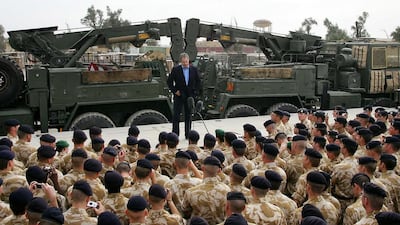What the Arab press is saying about the Chilcot report into how Britain decided to invade Iraq
After a seven-year investigation, the Chilcot report has declared the Iraq War unnecessary but stopped short of declaring it illegal.
Abdul Rahman Al Rashid, former editor-in-chief of the pan-Arab daily Asharq Al Awsat, said he expected the report to be much sterner, given the war’s failure.
“The lengthy report did not once indict former prime minister Tony Blair. It did not deem illegal his decision to wage a war against Iraq, nor did it call for his accountability or his interrogation,” he wrote.
“What is more, it acquitted Blair for the first time of the main charge of lying to Parliament. Blair did not apologise for the war nor did he back down.”
Mr Blair did apologise for mistakes such as the dismantling of Saddam’s army and government, but Al Rashid noted that that was a decision made by Washington which Mr Blair opposed.
The report blamed Mr Blair for not exhausting peaceful options before going to war but “did not find him at fault for waging the war”. It reproached his lack of patience, he concluded.
Writing in the London-based newspaper Al Arab, Hamed Al Kilani said the report has opened up the British government’s decision-making process to international public opinion, including the relatives of 179 British soldiers who died in Iraq. Some have spoken of prosecuting those who they say “misled the people and the House of Commons with inaccurate and malicious” information about Iraq.
“This information was brought about by factors unrelated to the main excuse for waging the war – namely Iraq’s possession of weapons of mass destruction, as well as chemical and nuclear weapons,” he wrote.
“Specialised United Nations inspection teams had been working for years to eliminate anything related to proscribed weapons programmes and they had accomplished their missions. The statements of UN chief weapons inspector Hans Blix provide irrefutable evidence that the US and the UK intended beforehand to invade and occupy Iraq in 2003.”
He described Mr Blair’s apology for the intelligence mistakes as, in light of the report’s findings, “a proactive move to drown out the expected tumult that would result from the publication of the documents and correspondence between him and US president George W Bush before the war”.
Much of the United States’ side of this correspondence will remain embargoed for another 25 years, but one US document that has emerged is the memo to Mr Bush sent by then secretary of state Colin Powell a year before the war and before the House of Commons’ vote on Britain’s participation.
It stated: “Blair will be with us should military operations be necessary.”
Al Kilani said Mr Blair has been reproached for ignoring the demonstrations held by millions of British citizens condemning the war on Iraq.
“This deep-rooted British democratic tradition is considered a popular referendum,” he noted.
“Justice means accountability for transgressions committed by the military, but it should also include the politicians who steer crimes of extermination and war.”
Al Kilani remarked that the witness stand seems a long way from those indicted in the report.
“However, this represents a golden opportunity for human rights organisations to stand in solidarity with Iraq and against war and terror everywhere, and to bring up the subject of compensation for the Iraqi victims and for the families of the British victims,” he concluded.
translation@thenational.ae

